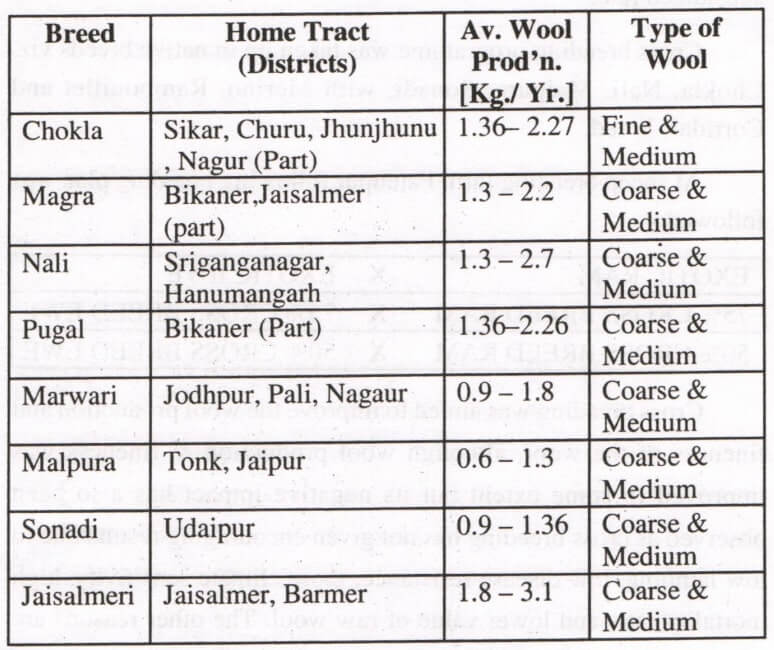Sheep husbandry has traditionally been one of, the most viable elements of the agro-economic system of the State of Rajasthan. The state earns annually remarkable revenue from wool, mutton and other products from Sheep in Rajasthan. Cost effective economy and less expensive housing make the sheep economically viable proposition for the poor people. The size of flock varies from 30 to 50, to as high as 400 sheep.
Major Challenges
- Development/Use of synthetic fiber in manufacturing of apparel and carpet wool.
- Shrinkage of pastureland.
- Poor exploitation of genetic potential of indigenous animals,
- Low absorption of available technology,
- Insufficient health cover,
- Inadequate marketing & credit support.
- Quality of Sheep.
Number of Sheep in Rajasthan
The 20th Livestock Census of India estimates the total number of sheep in country at 74.26 Million during 2019. Rajasthan, ranks at number 4 position in India in terms of number of sheep with an estimated population of 7.9 Million. The census 2019 estimates that there has been an decrease of 12.95% in their numbers from 2012 census (9.1 Million).
Draft Rajasthan State Livestock and Dairy Development Policy, 2019
The draft Rajasthan State Livestock and Dairy Development Policy, 2019 outlines following guidelines for development of Meat & Wool sector in state:
- Emphasis on small ruminants would be to improve nutrition and genetics, breeding strategies and health cover to increase proliferacy, carcass weight gain and reduced mortality to improve quality and quantity of meat, skin and wool.
- Selection of breeding stocks through large scale screening involving farmer’s flocks would be taken as a state program. The farmers would be encouraged to be organized as cooperatives or FPOs for better access to inputs and market gains.
Sheep Migration in Rajasthan
Migration of sheep is a regular feature of sheep rearing in the western parts of Rajasthan.
- Sheep from southern parts of Jodhpur-Jaisalmer pass through Bali, Abu-road through Palanpur, reach up to river beds in Baroda, and Surat where they spend about two months.
- Similarly sheep from northern parts of these regions go through Sawai-Madhopur or Hindaun city to river bank in Mathura.
- Usually, the farmers set out on their journey in winter and return to their homes in early monsoon.
- In Churu, Jhunjhunu and Sikar districts the flocks are relatively stable and they migrate for short period from their home village to grazing areas in neighbouring villages when the local pastures are exhausted.
Different Breeds of Sheep found in Rajasthan
Eight different sheep breeds have been identified in Rajasthan. These are:
- Jaisalmeri
- Found in Jaisalmer
- Naali
- Found in Hanumangarh, Churu, Bikaner & Jhunjhunu.
- Yields large quantity of wool
- Maalpuri
- Found in Jaipur, Dausa, Tonk, karauli & Sawai madhopur
- Magra
- Gives approximately 2 Kg of Wool per year
- Found in Jaisalmer, Bikaner, Churu, Nagaur
- Pugal
- Originated from Pugal in Bikaner
- Chokla or Shekhawati
- Also referred to as Marino of India
- It yields best quality wool and gives around 1-1.5 Kg per year.
- Sonari or Chanothar
- Sonadi are distributed in Udaipur and Kota division and are common in sub-humid and humid areas.
- They with-stand heavy rainfall conditions and extend into Gujarat state to the south
- Marwari
- Marwari are found all over Jodhpur, Jaipur and parts of Ajmer division

Government Initiatives to develop Sheep in Rajasthan
Sheep Breeding Programme
- To improve the sheep population of the state genetically by providing superior breeding males (rams) to the sheep breeders, Rajasthan Animal Husbandry Department is running a Sheep Breeding Farm at Fatehpur (Sikar).
- According to the departmental sheep breeding policy, the indigenous pure breed Ram (Chokala, Nali and Marwari) of the farm has been distributed to sheep breeders @ Rs. 50/- per Kg live weight. In the year 2018-19, the farm has distributed 243 proven Rams at subsidized cost to sheep breeders.
The Integrated Wool Development Programme (IWDP)
- The Integrated Wool Development Programme (IWDP) is an umbrella programme which will be implemented over three years i.e. from 2017-18 to 2019-20 in all wool producing states.
Organisations:
ICAR-CSWRI
- The Central Sheep and Wool Research Institute (CSWRI) is a premier Institute of Indian Council of Agricultural Research (ICAR) engaged in research and extension activities on sheep. It was established in 1962 at Malpura in Rajasthan. Now campus is popular by the name of Avikanagar in Tonk district.
ICAR – CAZRI
- The Central Arid Zone Research Institute (CAZRI) was established in 1959 under Indian Council of Agricultural Research (ICAR), New Delhi. C.A.Z.R.I has been involved in sheep research, both under farm and rangeland conditions.
Central Wool Development Board, Ministry of Textiles
Operates:
- The Wool Testing Laboratories (Pre loom) at Bikaner & Beawar.
- The Industrial Service Centre (Post Loom testing facilities) at Bikaner. Raw wool Scouring facilities at Beawer.
- Computer Aided Designing Centre (CAD) for carpet at Jaipur
- Wool Scouring and Drying Plant at Beawar
Animal Husbandry Department, GOR
- The Animal Husbandry Department thus came in to existence in 1958 along with Sheep and Wool and Fisheries sections. In 1984 the Fisheries Department was separated from the Department of Animal Husbandry making it an independent Department.
Rajasthan Livestock Development Board
- Rajasthan Livestock development Board was setup by state government on 25.03.1998 under the Rajasthan Societies Act 1958.
Read Ahead:
- Rajasthan Sheep Breeding Policy – Download PDF
- Different Breeds of Sheep in India – CSWRI
- Sheep Breeds in Rajasthan – Download PDF

